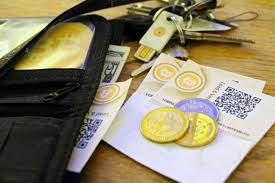How to protect your crypto coins?
So, now we know what, why and where to buy. But the most important questoin is how to keep your cryptos safe?
The easiest way to store your cryptos is to keep them on the exchange or broker you bought them. And when I say easiest, I mean both most convenient and easiest to lose them. Those sites (like any other) can be hacked and all your money stolen. It happened in the past and it will most certainly happen in the future. So, never leave a large amount of money on exchanges, especially for a long time. Just what you need for day trading, if you’re into that.
Next there are digital wallets (both online and desktop).
Desktop wallets (which you download and install on your computer) are accessible, easy to use and offer pretty good level of security. However, you can only access it from your computer and, more importantly, if you get some virus on your computer a hacker could get access to your private key (and thus your wallet and funds). And of course, if you don’t back it up and something happens to your hard drive, you can say goodbye to your coins.
Online (or cloud) wallets are accessible from any computer, you just need to enter your private key to use it. Which also means that your private keys are stored online and could also be relatively easily hacked.
Mobile wallets are apps on your phone used to store your coins (now, your coins aren’t actually on your phone, you just use the app to access your funds on the blockchain). You want to use apps they have multi signature accesses (to keep it secure) and backup features (to recover the wallet if you lose your phone). Those wallets are easy to use, and of course you can access them anywhere. But, there’s also a possibility of a hacker’s attack.
I won't reccomend any of them because I don't use them. Exepct for IOTA, because there's no alternative. So if you hold IOTA, this is a place to go. When you install it on your computer, you'll need to create a 81 caracter seed (which you'll have to use every time you want to access your wallet). I reccomend you do it your self, and not to use a generator. You can use all the letters and number 9. And keep it safe. If you lose it, no more IOTAs.
Next we have paper wallets. A paper wallet is a document that contains copies of the public and private keys that make up a wallet. Often it will have QR codes, so that you can quickly scan them and add the keys into a software wallet to make a transaction. The benefit of a paper wallet is that the keys are not stored digitally anywhere, and are therefore not subject to cyber-attacks or hardware failures.
The disadvantage of a paper wallet is that paper and ink can degrade, and paper is relatively fragile – it’s definitely worth keeping well away from fire and water for obvious reasons. Furthermore, if you lose a paper wallet, you’ll never be able to access the coins sent to its address. If you want to find out more on paper wallets and how to use them, click here. And bear in mind, IF YOU LOSE YOUR PAPER WALLET, YOU LOST ALL YOUR COINS.
And finally, the safest way to store your coins are hardware wallets. It is a wallet which stores the user's private keys in a secure hardware device. Private keys are often stored in a protected area of a microcontroller, and cannot be transferred out of the device in plaintext. They are immune to computer viruses and can be used securely and interactively. Of course, there is also a possibility that you’ll lose it, but unlike the paper wallet, you can recover your wallet on another device easily. When you set up any wallet, you need to write down the seed word (recovery phrase) on a piece of paper and store it in a safe place. Prefer making 2-3 copies & distribute it. Because, if you lose that as well, you lost all your coins.
The downside is that they aren’t cheap. With the average price around $100 there’s no point to buy it if you’re gonna keep $100 (or less) worth coins. And also, you can use them with just a handful of coins.
Once again, you need to calculate what’s best for you.
Some of the best are Ledger Nano S (I use this one, and yes that is an affiliate link). You can use it to store Bitcoin, Ethereum, Litecoin, Ripple, Ark, Bitcoin Cash, Ethereum Classic, Dogecoin, Zcash, Dash, Stratis, Komodo, PoSW and ERC20 tokens. The second one is Trezor (Bitcoin, Ethereum, Litecoin, Bitcoin Cash, Ethereum Classic, Dogecoin, Zcash, Dash, Namecoin and ERC20 tokens) and the third KeepKey (Bitcoin, Ethereum, Litecoin, Namecoin, Dash, Dogecoin).
Back up your wallet, keep them up to date and, as always, STAY SAFE AND HODL!
DISCLAIMER: I am not a financial advisor. All thoughts in this post are my personal opinion and not a financial advice. You should always do your own research before any investment.
